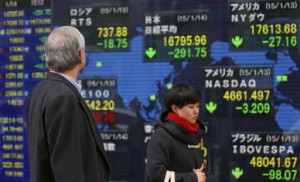Asia markets hurt as oil extends losses, yen rises

A man looks at an electronic stock indicator in Tokyo Wednesday, Jan. 14, 2015. Asian shares sank Wednesday following a volatile session on Wall Street as investors remained edgy over the slump in oil and metal prices. AP PHOTO/SHIZUO KAMBAYASHI
HONG KONG–Oil prices fell further Wednesday, heading to six-year lows, while crude’s weakness continues to test investor confidence, pushing the yen up and weighing on Asian equities.
The euro edged up against the dollar after diving Tuesday on comments from a key member of the European Central Bank that fanned expectations it will unveil a bond-buying scheme at its policy meeting next week.
On oil markets US benchmark West Texas Intermediate for February was down 58 cents at $45.31, a level not seen since March 2009, and Brent slipped 54 cents to $46.05, its lowest since April 2009.
Both contracts were hammered Tuesday after two members of OPEC said the cartel could not prevent prices from plunging further, despite losing more than 50 percent since June.
Ministers from the United Arab Emirates and Kuwait also said prices could drop further unless there was a cut in booming shale oil output in the United States.
Analysts say richer cartel members–such as the UAE and Saudi Arabia–have been ready to accept falls in the hope they will force higher-cost shale producers out of the market.
The weak prices have hit buying sentiment for global equities, with the Dow, S&P 500 and Nasdaq all sinking in New York.
Tokyo tumbled 1.71 percent, or 291.75 points, to finish at 16,795.96, while Sydney sank 0.95 percent, or 51.1 points, to 5,353.6 and Seoul fell 0.18 percent, or 3.48 points, to 1,913.66.
Shanghai–which surged more than 50 percent last year on hopes for government measures to boost the economy–fell 0.40 percent, or 12.86 points, to end at 3,222.44, while Hong Kong slipped 0.43 percent, or 103.37 points, to 24.112.60.
ECB stimulus talk
On currency markets a flight to safer investments saw the yen advance.
The dollar was at 117.14 yen Wednesday, down from 117.90 yen in New York and well off rates above 118 yen seen in Tokyo earlier Tuesday. The euro was at 138.35 yen compared with 138.84 yen in US trade.
“The drop in oil prices is quite severe, so whenever there’s some weakness in oil we tend to see risk aversion,” Hiroichi Nishi, an equities manager at SMBC Nikko Securities Inc. in Tokyo, told Bloomberg News.
“It’s also heightening concerns of a negative influence on materials and infrastructure-related industries in the US, which would lower inflation and push out the timing of a possible interest-rate hike.”
The euro edged up against the dollar, buying $1.1800 against $1.1777 in US trade.
The single currency took a hit Tuesday after Ewald Nowotny, a governor of the Austrian central bank and a member of the ECB governing council, highlighted the need for policy makers to tackle the threat of deflation.
“It is important that one takes deflation risks seriously and addresses them,” Nowotny said, according to Bloomberg News, adding that the bank was weighing several stimulus measures. “We shouldn’t wait too long with a reaction.”
Analysts said the remarks were a sign the ECB may act when it meets on January 22, in part because Nowotny is not known for being particularly interventionist.
ECB President Mario Draghi warned, however, that the central bank does not have many options left if it wants to ease monetary conditions in the single currency area still further to ward off deflation.
Gold, meanwhile, was $1,228.48 an ounce, compared with $1,238.84 on Tuesday.
In other markets:
— Mumbai fell 0.29 percent, or 78.91 points, to end at 27,346.82 points.
Sesa Sterlite slid 7.63 percent to 188.85 rupees, while Hindustan Unilever gained 4.21 percent to 921.95 rupees.
— Bangkok fell 0.76 percent, or 11.73 points, to 1,523.24.
Pruksa Real Estate slipped 4.00 percent to 30 baht, while Bangchak Petroleum dropped 2.31 percent to 31.75 baht.
— Malaysia’s main stock index dropped 0.39 percent, or 6.89 points, to end at 1,742.01.
AMMB Holdings shed 0.62 percent to close at 6.41 ringgit while Malayan Banking lost 2.67 percent to 8.39. British American Tobacco went up by 4.13 percent to 67.50 ringgit.
— Jakarta closed down 1.05 percent, or 54.69 points, at 5,159.67.
Bank Permata rose 0.66 percent to 1,520 rupiah while palm oil producer Astra Agro Lestari fell 3.86 percent to 24,900 rupiah.
— Singapore closed down 0.45 percent, or 14.91 points, at 3,326.16.
OCBC Bank fell 1.53 percent to Sg$10.28 while Oil rig maker Keppel Corp. closed down 0.86 percent to Sg$8.10.
— Taipei shed 0.56 percent, or 51.57 points, to 9180.23.
Taiwan Semiconductor Manufacturing Co. fell 1.89 percent to Tw$130.0 while smartphone maker HTC rose 1.02 percent to Tw$149.0.
— Wellington added 0.21 percent, or 12.02 points, to 5,648.63.
Genesis Energy was up 1.44 percent at NZ$2.12 and Air New Zealand was flat on NZ$2.62.
— Manila surged 1.24 percent, or 91.88 points, to 7,490.88.
Universal Robina added 1.88 percent to 200.40 pesos and SM Investments advanced 2.64 percent to 873.50 pesos, while Ayala Land ended 2.05 percent higher at 34.85 pesos.














